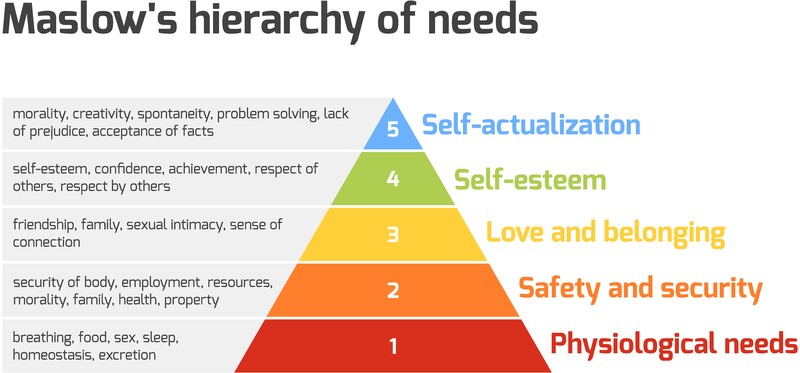After Abraham Maslow developed his hierarchy of needs, he decided that people could have “peak experiences” – high points in life when they felt in harmony with themselves and their surroundings.
Some people describe these moments as being filled with joy of the purest kind. For others, they are a spiritual experience. Most people find them significant and fulfilling. During these experiences we feel fully alive.
Peak experiences play an important role in self-actualization – the highest level of Maslow’s hierarchy of needs (although he never portrayed it as a pyramid). But ordinary people can have peak experiences whereas few people attain a state of self-actualization. Maslow felt that self-actualized people tend to have peak experiences more often than ordinary people do.
Some people find that experiences like this are more likely to occur during artistic, athletic or religious activities. Or while they are spending time in nature or during intimate moments with family or friends. Do you ever have peak experiences like this?
During the 1960s Maslow founded the school of “transpersonal psychology” with Stanislav Grof, Viktor Frankl, James Fadiman, Anthony Sutich, Miles Vich and Michael Murphy. Before he did this, Maslow had taken a “humanistic” approach to psychology as he felt that people possess the inner resources for growth and healing and that the point of therapy is to help remove obstacles to individuals’ achieving them.
Maslow later felt that “humanistic psychology” was incapable of explaining all aspects of human experience. He felt that various mystical, ecstatic, or spiritual states known as “peak experiences” were beyond self-actualization (the highest “need” on his hierarchy of needs).
Are peak experiences the same as “flow” experiences?
Peak experiences are similar to the concept known as “flow” described by Mihaly Csikszentmihalyi – a positive psychologist. During flow experiences, you become so involved in an activity that the world seems to fade away and nothing else seems to matter. Times flies by.
This state of flow can happen during a peak experience. But not all states of flow are classed as peak experiences.
How can you have a peak experience?
It helps if you have removed yourself from distractions like notifications that you have received new emails. Don’t let your mind be absorbed by the shallowness of meaningless tasks like sorting emails or scrolling through social media. You have to enter a state in which you are focused. Doing some exercise beforehand can help as then oxygen is flooding your brain and you aren’t just slipping back into the malaise of feeling tired.
Talking to a psychiatrist, psychiatric nurse practitioner or counselor about what is holding you back from doing these sorts of things can help.

